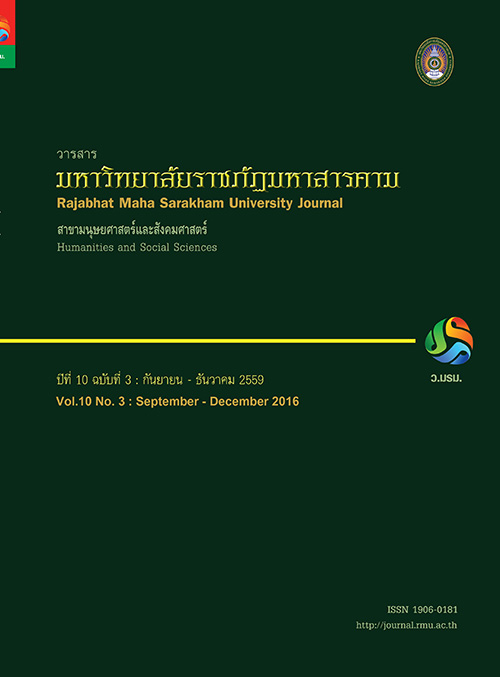รูปแบบการพัฒนาทูตศีลธรรมระดับชุมชน A Model for Development of Local Moral Ambassadors
Main Article Content
บทคัดย่อ
การวิจัยครั้งนี้มีวัตถุประสงค์เพื่อ 1) ศึกษาการใช้แนวคิดเศรษฐกิจพอเพียง ด้วยหลักเบญจศีล เบญจธรรมของชุมชนตำบลท่า
สองคอน และแนวทางการพัฒนาชุมชนตามหลัก เบญจศีล เบญจธรรมและแนวคิดเศรษฐกิจพอเพียง 2) พัฒนารูปแบบทูตศีลธรรม
ระดับชุมชน ตำบลท่าสองคอน 3) เพื่อขับเคลื่อน “ทูตศีลธรรมระดับชุมชน” ในพื้นที่วัดขุนพรหมดำริ ตำบลท่าสองคอน อำเภอเมือง
จังหวัดมหาสารคาม และ 4) ขยายผลรูปแบบทูตศีลธรรมระดับชุมชนสู่การสร้างชุมชนเครือข่ายทูตศีลธรรมในพื้นที่อื่น ๆ วิธีการวิจัย
แบบผสานวิธี (Mixed method) คือการวิจัยเชิงปริมาณ และวิธีการวิจัยเชิงคุณภาพ การวิจัยแบ่งออกเป็น 4 ระยะ กลุ่มเป้าหมายที่ใช้
ในระยะที่ 1 และ 3 ได้แก่ พุทธศาสนิกชนที่เข้าร่วมโครงการวัดวิถีพุทธ เปิดวัดอาทิตย์ ณ วัดขุนพรหมดำริ จำนวน 30 คน กลุ่มเป้า
หมายที่ใช้ขยายผลในระยะที่ 4 พุทธศาสนิกชนที่เข้าร่วมโครงการวัดวิถีพุทธ เปิดวัดอาทิตย์ ณ วัดมหาชัย จำนวน 20 คน เครื่องมือที่
ใช้ คือ รูปแบบการพัฒนาทูตศีลธรรมระดับชุมชน และแบบประเมินรูปแบบโดยผู้เชี่ยวชาญ แบบประเมินความพึงพอใจที่มีต่อรูปแบบ
ทูต แบบทดสอบความรู้ก่อนเรียน และหลังเรียน แบบวัดคุณสมบัติทูตศีลธรรมระดับชุมชน และแบบสังเกตพฤติกรรมศีลธรรมระดับ
ชุมชน สถิติที่ใช้ในการวิจัย ได้แก่ ค่าเฉลี่ย ค่าร้อยละ และส่วนเบี่ยงเบนมาตรฐาน นำเสนอผลการวิจัยแบบตารางและการพรรณนา
วิเคราะห์ ผลการวิจัยพบว่า
1. การใช้แนวคิดเศรษฐกิจพอเพียง ด้วยหลักเบญจศีล เบญจธรรมของชุมชนตำบลท่าสองคอน และแนวทางการพัฒนาชุมชน
ตำบลท่าสองคอนตามหลัก เบญจศีล เบญจธรรมและแนวคิดเศรษฐกิจพอเพียง พบว่า ผลการจัดสนทนากลุ่มชุมชนตำบลท่าสองคอน
ได้ปฏิบัติตามหลักเบญจศีล และเบญจธรรม 5 ข้อ และสอดคล้องกับแนวคิดเศรษฐกิจพอเพียง 3 ห่วง 2 เงื่อนไข แต่มีปัญหาและ
อุปสรรคของบุคคลในการปฏิบัติตนตามแนวคิดเศรษฐกิจพอเพียงด้วยหลักเบญจศีล และเบญจธรรม คือ ศีลข้อที่ 5 การดื่มสุราเด็ก
และเยาวชนถูกชักชวนจากเพื่อนลอกเลียนแบบจากสื่อสารมวลชน และผู้ปกครองปฏิบัติตนดื่มสุราและปฏิบัติตนไม่ดี คิดเป็นร้อยละ
83.33 ศีลข้อที่ 1 เด็กและเยาวชนมีพฤติกรรมชอบทรมานสัตว์ คิดเป็นร้อยละ 66.66 และศีลข้อที่ 2 ชุมชนยังมีการลักทรัพย์คิดเป็น
ร้อยละ 50.00 ในส่วนแนวทางที่ต้องการพัฒนาชุมชนตามหลัก เบญจศีล เบญจธรรมและแนวคิดเศรษฐกิจพอเพียง พบว่า 1) ชุมชนมี
ปัจจัยเอื้อคือมีวัดขุนพรหมดำริที่ได้จัดทำโครงการวัดวิถีพุทธ 2) ต้องการบุคคลที่ทำหน้าที่เป็นทูตศีลธรรมระดับชุมชนทุกเพศทุกวัย
คิดเป็นร้อยละ 100.00 และเป็นบุคคลที่มีลักษณะเป็นผู้ถ่ายทอดที่ดีโดยการมีความรู้แนวคิดเศรษฐกิจพอเพียงด้วยหลักเบญจศีล และ
เบญจธรรม คิดเป็นร้อยละ 83.33 3) ต้องเป็นบุคคลที่ต้องทำตนให้เป็นตัวอย่างแก่บุคคลอื่นด้วยความเสียสละด้วยความเต็มใจร้อย
ละ 80.00 และ 4) ต้องผ่านการอบรมจากหลักสูตรที่วัดกำหนดให้ร้อยละ 76.66
2. ผลการพัฒนารูปแบบทูตศีลธรรมระดับชุมชนตำบลท่าสองคอน พบว่า รูปแบบทูตศีลธรรมระดับชุมชนมีความเหมาะสม
0.86 มีองค์ประกอบรูปแบบคือ 1) แนวคิดและทฤษฎีการสร้างรูปแบบ 2) คุณสมบัติของทูตศีลธรรมระดับชุมชน มีคุณสมบัติ 5 ประการ
คือ T-Teacher ความเป็นครู A-Attitude มีเจตคติที่ดี K-Knowledge มีความรู้ ความเข้าใจ A-Awareness มีความตระหนักใน
การเป็นทูต B-Best การปฏิบัติหน้าที่ทูตให้ดีที่สุด และ 3) กระบวนการถ่ายทอดรูปแบบทูตศีลธรรมระดับชุมชนด้วยหลักสูตรฝึกอบรม
โดยหลักสูตรมีองค์ประกอบ คือ หลักการและเหตุผล วิสัยทัศน์ พันธกิจ วัตถุประสงค์ เนื้อหา สื่อที่ใช้ และการประเมินผล 4)
การทดลองใช้รูปแบบ และ 5) การประเมินผลรูปแบบ โดยใช้เครื่องมือคือแบบประเมินหลักสูตร
3. ผลการขับเคลื่อน ทูตศีลธรรมระดับชุมชนในพื้นที่วัดขุนพรหมดำริ ตำบลท่าสองคอน อำเภอเมือง จังหวัดมหาสารคาม
พบว่า ผู้ที่เข้ารับการอบรมตามรูปแบบทูตศีลธรรมระดับชุมชน จำนวน 30 คน โดยใช้เครื่องมือ แบบวัดคุณสมบัติทูตศีลธรรมระดับ
ชุมชน แบบทดสอบก่อนเรียน และหลังเรียน แบบสังเกตพฤติกรรม และแบบสอบถามความพึงพอใจ โดยผ่านเกณฑ์ทุกคน มีคะแนน
หลังเรียนมีคะแนนเพิ่มขึ้นทุกกลุ่ม และมีความพึงพอใจต่อรูปแบบทูตศีลธรรมระดับชุมชนโดยรวมอยู่ในระดับมากที่สุด เมื่อพิจารณา
เป็นรายด้านอยู่ในระดับมากที่สุด 2 ด้าน คือกิจกรรมการอบรม และการบริหารโครงการ ส่วนอยู่ในระดับมาก มีด้านความรู้ เนื้อหาการ
จัดการอบรม
4. ผลการใช้รูปแบบการขยายผลทูตศีลธรรมระดับชุมชน พบว่า ทูตศีลธรรมที่เข้ารับการอบรมจำนวน 20 คน มีความพึงพอใจ
ตอ่ รูปแบบทูตศีลธรรมระดับชุมชน ในภาพรวมอยใู่ นระดับมากที่สุด แตเ่ มื่อพิจารณารายดา้ นมี 2 ดา้ นอยใู่ นระดับมากที่สุดคือ กิจกรรม
การอบรม และการบริหารโครงการ ส่วนด้านความรู้เนื้อหาการอบรมอยู่ในระดับมาก
This research aimed to 1) investigate application of the Sufficiency Economy Philosophy with the Five
Precepts Principles in Ta Songkorn Community and seek guidelines for community development based on
these principles; 2) develop a model for development of Ta Songkorn moral ambassadors; 3) try out the model
for development of local moral ambassadors at Wat Khunprom Dumri, Tambon Ta Songkorn, Muang District,
Maha Sarakham Province; and 4) implement the model and expand the network of moral ambassadors in
other local areas. This mixed method of quantitative and qualitative research was conducted in 4 phases,
with the target group for Phase 1 and 3 consisting of 30 Buddhist practitioners at Wat Khun Prom Dumri, and
the other target group consisting of 20 practitioners participating in the implementation of the model. The
instruments used in this study were a model for development of local moral ambassadors, a model evaluation
form, a satisfaction questionnaire, a test for assessing knowledge before and after training, a form for determining
characteristics of local moral ambassadors, and a moral behavior observation form. The statistics used in
this study were mean, percentage, and standard deviation; and research results were presented in tables
and descriptive analyses. Findings reveal that the target group apply the Five Precepts and Dharma principles
in consistence with the 3 loops & 2 conditions of the sufficiency economy principles. Problems and constraints
in observing the Fifth Precept (refraining from alcoholic drinks) were due to their friends’ persuasion, imitating
what is perceived in mass media, and parents’ alcoholic drinking behavior (83.33%); in the First Precept
(refraining from harming or killing lives), due to some children and youths’ pleasure in killing and torturing
animals (66.66 %); and in the Second Precept (refraining from stealing), as seen in some cases of thefts or
stealing in the community ( 50.00 %). Regarding community development based on the Five Precepts &
Dharma principles and the Sufficiency Economy, the study reveals the following suggestions: 1) the community
has a supporting factor in having Wat Khunprom Dumri to organize the Buddhist-Oriented Sunday School
Project; 2) there should be local moral ambassadors of all ages and genders (100%); 3) the moral ambassadors
should possess knowledge-transfer abiliy in the sufficiency economy and the Five Precepts & Dharma Principles
(83.33%); 3) they must be role models for public services and willingness to sacrifice (80.00%); and 4) they
must participate in the training program organized by the temple (76.66%).
2. The developed model was evaluated as being appropriate (0.86) and consists of the following
elements: 1) Principles and Theories in Constructing a Model; 2) Five Characteristics of Local Moral
Ambassadors: T-Teacher, A-Attitude, K-Knowledge, A-Awareness, and B-Best; 3) the training process for
local moral ambassadors consists of five elements: Rationale, Vision, Missions, Objectives, Contents,
Instructional Media, and Evaluation; 4) Implementation of the model; and 5) Model Evaluation using the
program evaluation form.
3. Regarding the tryout of the model at Wat Khun Prom Dumri, Tambon Ta Songkorn, Muang District,
Maha Sarakham Province, 30 participants of the training were assessed by using the evaluation form to
determine characteristics of local moral ambassadors, a test for assessing participants’ knowledge before
and after the training, the behavior observation form, and the satisfaction questionnaire. The results showed
that all the trainees passed the criteria with increased post-test achievement in every aspect of knowledge;
and their overall satisfaction with the developed model was found at the highest level, with the following 2
specific aspects found at the highest level: training activities and project management, while knowledge and
contents were determined at the high level.
4. Results of the model implementation at Wat Mahachai , a temple in another local area, reveal that
the overall satisfaction of the participants was found at the highest level; two specific aspects, activities and
project management were found at the highest level while the knowledge and contents were determined at
the high level of satisfaction.
Article Details
1. บทความที่ลงตีพิมพ์ทุกเรื่องได้รับการตรวจทางวิชาการโดยผู้ประเมินอิสระ ผู้ทรงคุณวุฒิ (Peer Review) สาขาที่เกี่ยวข้อง อย่างน้อย 3 ท่าน ในรูปแบบ Double blind review
2. ข้อคิดเห็นใด ๆ ของบทความที่ลงตีพิมพ์ในวารสารมหาวิทยาลัยราชภัฏมหาสารคาม นี้เป็นของผู้เขียน คณะผู้จัดทำวารสารไม่จำเป็นต้องเห็นด้วย
3. กองบรรณาธิการวารสารมหาวิทยาลัยราชภัฏมหาสารคาม ไม่สงวนสิทธิ์การคัดลอกแต่ให้อ้างอิงแสดงที่มา


